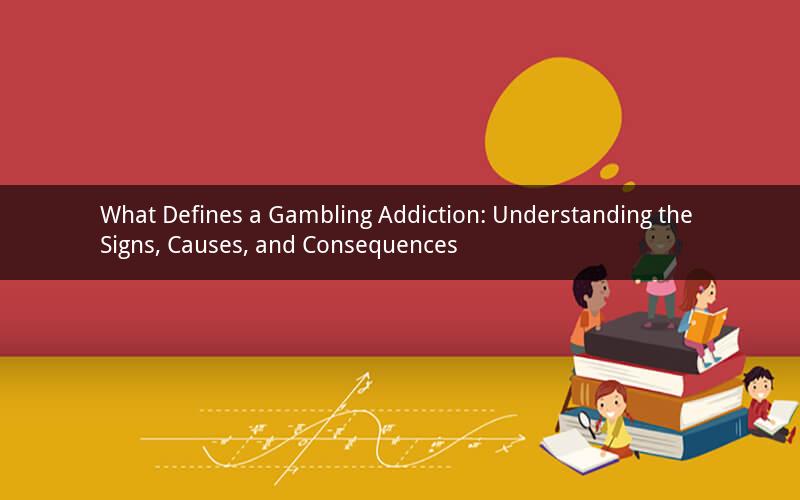
Gambling addiction, often referred to as problem gambling, is a complex issue that affects millions of individuals worldwide. It is characterized by an inability to control or stop gambling, despite negative consequences. This article delves into what defines a gambling addiction, its signs, causes, and consequences.
Signs of a Gambling Addiction
1. Preoccupation with gambling: A person with a gambling addiction often spends a significant amount of time thinking about gambling, planning their next bet, or reliving past gambling experiences.
2. Loss of control: Despite attempts to stop or control gambling, individuals with an addiction find it difficult to resist the urge to gamble. They may continue to gamble even when they know it is causing harm to themselves or others.
3. Escalating stakes: As the addiction progresses, individuals may feel the need to increase their bets to experience the same level of excitement or satisfaction.
4. Financial problems: Gambling addiction can lead to significant financial difficulties, including debt, loss of savings, and inability to pay bills.
5. Relationship issues: The addiction may strain relationships with family, friends, and loved ones, leading to conflicts, isolation, and emotional distress.
6. Legal problems: Individuals with a gambling addiction may engage in illegal activities to fund their gambling habits, such as theft or fraud.
7. Health issues: The stress and anxiety associated with gambling addiction can lead to physical and mental health problems, including insomnia, anxiety, depression, and substance abuse.
Causes of a Gambling Addiction
1. Genetic predisposition: Research suggests that genetics play a role in the development of gambling addiction. Individuals with a family history of addiction may be more susceptible to developing a gambling addiction.
2. Environmental factors: Exposure to gambling opportunities, such as casinos, online gambling sites, and gambling advertisements, can increase the risk of developing an addiction.
3. Psychological factors: Individuals with certain personality traits, such as impulsivity, thrill-seeking, and low self-esteem, may be more prone to developing a gambling addiction.
4. Social factors: Peer pressure, social isolation, and the desire to belong to a group may contribute to the development of a gambling addiction.
5. Trauma and stress: Individuals who have experienced trauma or are under significant stress may turn to gambling as a way to cope with their emotions.
Consequences of a Gambling Addiction
1. Financial consequences: Gambling addiction can lead to significant financial difficulties, including debt, bankruptcy, and loss of savings.
2. Relationship consequences: The addiction can strain relationships with family, friends, and loved ones, leading to conflicts, isolation, and emotional distress.
3. Health consequences: The stress and anxiety associated with gambling addiction can lead to physical and mental health problems, including insomnia, anxiety, depression, and substance abuse.
4. Legal consequences: Individuals with a gambling addiction may engage in illegal activities to fund their gambling habits, such as theft or fraud.
5. Social consequences: The addiction can lead to social isolation, loss of employment, and a decrease in overall quality of life.
FAQs
1. What is the difference between problem gambling and a gambling addiction?
Answer: Problem gambling refers to any gambling behavior that causes harm to the individual or others. A gambling addiction is a more severe form of problem gambling, characterized by an inability to control or stop gambling despite negative consequences.
2. Can a person recover from a gambling addiction?
Answer: Yes, recovery from a gambling addiction is possible. Many individuals have successfully overcome their addiction with the help of therapy, support groups, and other resources.
3. Are there any treatments available for gambling addiction?
Answer: Yes, there are various treatments available for gambling addiction, including therapy, support groups, and medication. Therapy, such as cognitive-behavioral therapy (CBT), is often recommended to help individuals develop healthier coping mechanisms and address underlying issues.
4. Can a person be addicted to online gambling?
Answer: Yes, online gambling can be addictive. The convenience and accessibility of online gambling platforms can make it easier for individuals to develop an addiction, as they can gamble from the comfort of their own homes.
5. How can I help someone with a gambling addiction?
Answer: If you suspect someone has a gambling addiction, it is important to approach the situation with empathy and support. Encourage them to seek professional help, offer to attend therapy sessions with them, and provide a safe and non-judgmental environment for them to express their feelings.